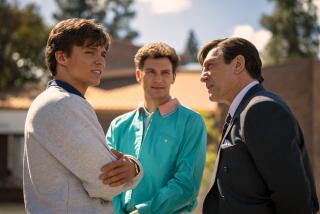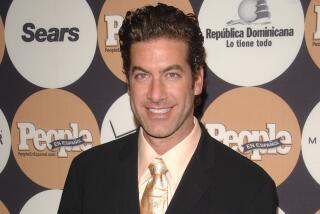Coleman’s Back With a New ‘America’
The Ornette Coleman revival has peaked this week with a remarkable four days of events at New York City’s Lincoln Center celebrating the music of the saxophonist seen by many as the trigger for the revolutionary jazz movements of the ‘60s.
On Tuesday and Wednesday, the New York Philharmonic, with Kurt Masur conducting, performed Coleman’s orchestral work “Skies of America” with Coleman and his group, Prime Time. In its original Columbia Records version in 1972, it was recorded by the London Symphony Orchestra with Coleman as the only soloist--the result reportedly of the British Musicians’ Union’s refusal to allow his quartet to participate.
Rarely heard in the intervening 25 years, the version premiered by the philharmonic on Tuesday and Wednesday was effectively a new work, with Coleman’s new additions and alterations extending the piece to nearly twice the length of the original recording.
But Coleman’s vision of the original music remained. At the time, he saw the work as a statement of optimism--a quality that characterizes even his most difficult music. In the album’s liner notes he wrote sadly of the “assassinations,” “racial wars” and “death of God” that had filled the ‘60s. “What then is left to happen under the skies of America but the goodness,” he continued, “a country with so many changes within the nature of its people must have something very special in store for the world to enjoy. . . .”
Reaction to the performance of the work by Coleman, Prime Time and the philharmonic under Masur was generally favorable from members of the jazz community.
Billboard’s Jim Macnie described the “seamless connections between Ornette’s jazz passages and the European qualities of the orchestral segments.” The presence of Prime Time, he felt, provided the work with even more interesting contrasts.
Larry Blumenfeld, editor of Jazziz magazine, attended both nights of the “Skies of America” program and found the performances to be deeply moving.
“This wasn’t Third Stream--a conscious effort to marry one thing with another,” he said referring to Gunther Schuller’s combination of jazz and symphonic music. “It wasn’t like ‘Bird’ [Charlie Parker] with strings. It was as though Ornette was saying, ‘This is my music, and I’m continuing to write my music in a wider arena.’ And it worked. . . . There were passages where the orchestra strings were playing blues, and they probably didn’t even know it. Masur and the philharmonic were swinging.”
“But what was really important about the concert,” Blumenfeld said, “was that it made it clear that jazz is much more broad and diffuse than the definitions that are usually applied to it.”
In Thursday night’s program, Coleman was reunited with the surviving members--bassist Charlie Haden and drummer Billy Higgins (trumpeter Don Cherry died in 1995)--of the quartet that came to New York City in 1959 and kicked off the wild array of jazz exploration generally grouped under the labels “avant-garde,” “free jazz” and “new thing.” Titled “In All Languages,” the program featured new music performed by an ensemble that included guest artists Wallace Roney, trumpet, and Kenny Barron, piano.
Tonight, Coleman’s Prime Time--with an array of dancers and artists--performs “Tone Dialing,” a work that provoked an electrifying audience reaction when it was premiered in 1994 at the San Francisco Jazz Festival--primarily because of the body-piercing done live, onstage, during the performance. Coleman’s intention, then and now, has been to find common linkages between musicians, dancers and artists, a linkage that was distorted in San Francisco by the visual impact of the body-piercing. Tonight’s program is scheduled to include sword-swallowing, an individual reclining on a bed of nails, as well as the reported participation of singer Lou Reed and performance artist Laurie Anderson. It remains to be seen whether or not this performance will achieve Coleman’s expressed desire to have all the performers “embrace the possibilities inherent in a note.”
Coleman’s music, as well as the philosophy of his theoretical system, “Harmolodics,” can be examined in some detail in his attractive Web site (https://harmolodic.com).
Signings: Guitarist Pat Metheny has been signed to a long-term contract with Warner Bros. Records. The association has some homecoming aspects to it, since Metheny was one of ECM’s most important artists from the mid-’70s to the mid-’80s, when the label was distributed by Warner Bros.
According to Metheny, the company’s “intense involvement in the early part of my career was extremely important in laying the foundations for my band and myself. They gave us the opportunity to discover our own music on our own terms.”
The first release, scheduled for later this year, will feature the Pat Metheny Group, an ensemble that surfaced rarely on disc during his 12 years with Geffen, when Metheny spent much of his studio time recording with symphony orchestras and in all-star ensembles and collaborations.
Free Music: The Michael Session Quintet plays in the L.A. County Museum of Art’s admission-free jazz set in the plaza at 5:30 tonight, (213) 857-6010. . . . Dori Caymmi, veteran guitarist and member of one of Brazil’s most distinguished musical families, plays a free concert tonight at the UCLA/Armand Hammer Museum at 6:30 p.m., (310) 824-6365. . . . The Reiner Scivally Quintet appears at Pedrini Music’s free afternoon concert Saturday in Alhambra at 1:30 p.m., (818) 289-0241. . . . The Art Davis Quartet plays a free program of jazz at the Watts Towers Art Center, Sunday at 3 p.m, (213) 847-4646. . . . The Gerald Wilson Big Band is in the plaza of LACMA Sunday at 1:30 p.m., (213) 857-6010. . . . Harold Land brings his quartet (featuring drummer Billy Higgins) to the Geffen Contemporary at MOCA Thursday for a free concert of hard bop, (213) 621-1749.
More to Read
The biggest entertainment stories
Get our big stories about Hollywood, film, television, music, arts, culture and more right in your inbox as soon as they publish.
You may occasionally receive promotional content from the Los Angeles Times.










